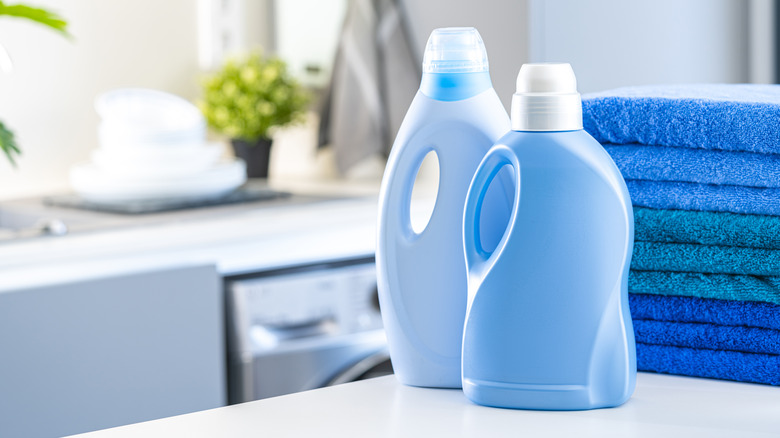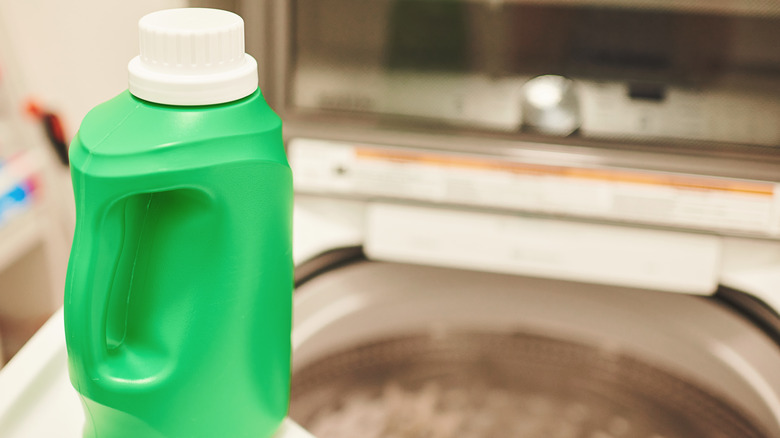Why Storing Your Laundry Detergent In The Garage Could Be A Big Mistake
Whether you have 400 square feet or 4,000, at some point, everyone becomes cramped for space. This is especially true when you buy big, bulky items such as cleaning supplies. Those can be cumbersome to store in cupboards and closets, especially if they're already stuffed to the gills with items. In those cases, most of us keep our overflow in the garage. But that might not be the best place to house everything. For example, you would be better off storing your laundry detergent elsewhere. Unless the space is heated or air conditioned around the clock, the detergent will freeze when the temperatures plummet or separate when they skyrocket, rendering the soap unusable.
This makes sense since these products contain water. Concentrated detergents — the kind that you only need a drop or two of to clean an entire load — can have anywhere between 15 to 50% water. On the other hand, unconcentrated versions can be composed of up to 90% water, guaranteeing they will freeze once the temperatures get frosty. While different brands may vary at which temperature point they freeze, on average, water-heavy versions will begin to ice over at 32 degrees. However, some consumers have anecdotally found that the concentrated ones require temps to dip below -32 Fahrenheit. As for heat, you don't want the garage to get over 85 degrees — after that, the ingredients can begin to separate, changing the chemical makeup and cleaning power of the product.
Why you should avoid temperate fluctuations in detergents
While you want to ideally store your detergent in a cool area of your house, the garage isn't the right spot because the temperatures aren't stable. Unless it's well-insulated and air-conditioned, your garage will fluctuate with the outdoor temp. So why is this bad for your detergent? It can alter the efficiency of the soap. If the detergent becomes too hot, the formula will destabilize and the ingredients will begin to pull apart, ruining its ability to properly wash your clothes and linens. At that point, the product might become useless, requiring you to toss it.
Something similar happens when you freeze and thaw the soap. There is a chance the cold temperatures can speed up how quickly it expires. That's because any temperature fluctuation can begin to break down the formula, altering its effectiveness. Additionally, having frozen detergent is incredibly inconvenient. Rather than grabbing it from the storage area and finishing up your load, you won't be able to use it right away. Instead, you will have to wait several hours for it to fully defrost.
Where to store your detergent
Where you should store your detergent depends on what kind you use. If you prefer pod detergents, then your main concern is storing it somewhere without moisture. Pop them into an airtight container to protect them from humidity or possible water leaks, and keep them in places that don't have fluctuating humidity or temperature dips. Because of this, it's best to keep them out of the kitchen, bathroom, unfinished basement, or garage. Instead, try storing them in a cleaning closet away from any water or steam.
If you prefer to use liquid detergent, it's important to store it in a place that has stable temperatures. If there is room in your laundry room, try storing it further away from your appliances since they can heat up and make the room warm after use. Powdered detergents are a little less finicky since they don't technically expire and are a little more stable. The only thing you need to focus on is keeping them away from moisture and excessive humidity since the addition of water can make the powder turn clumpy and unusable.


